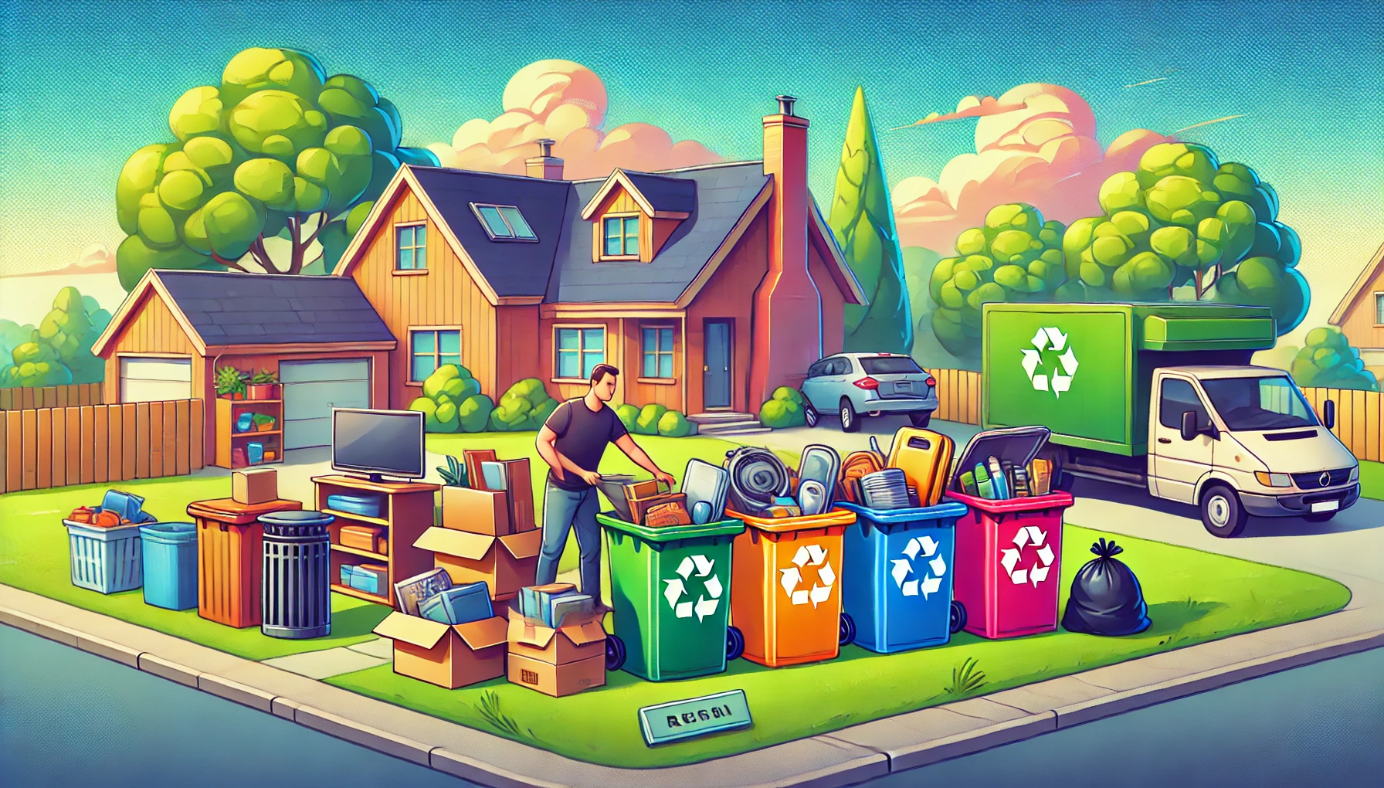
A Complete Guide to Household Junk Disposal – How to Declutter Responsibly
Got unwanted items piling up around the house? From broken furniture to old appliances, household junk can accumulate quickly, turning your home into a cluttered space. Disposing of household junk can be a challenge, but with the right strategies, you can make it a hassle-free and eco-friendly experience. In this guide, we’ll explore various household junk disposal options, including recycling, donating, and junk removal services, along with tips to make decluttering easier.
Why Household Junk Disposal Matters
Proper junk disposal isn’t just about having a cleaner home. It also contributes to:
- Environmental Protection: Disposing of junk responsibly reduces landfill waste, conserves resources, and prevents pollution.
- Health and Safety: Cluttered spaces increase the risk of tripping and falling, and old items can harbor dust, mold, and other allergens.
- Improved Mental Well-being: Decluttering creates a more organized space, which can improve focus and reduce stress.
Common Types of Household Junk and How to Dispose of Them
Household junk comes in various forms, each with its own disposal methods. Here’s a breakdown of common household items and the best ways to get rid of them:
1. Old Furniture
Furniture is one of the most challenging items to dispose of due to its size and weight. Depending on the condition, you can:
- Donate: Charities like Goodwill and Habitat for Humanity often accept gently used furniture.
- Sell or Give Away: Consider online marketplaces if the item is in good condition.
- Recycle: Some junk removal companies recycle materials like wood and metal from furniture.
2. Electronics (E-Waste)
Electronics require special handling because they contain hazardous materials that shouldn’t go into landfills.
- Recycle: Many electronics stores, recycling centers, and junk removal companies offer e-waste recycling.
- Donate: If the device still works, consider donating it to a school or non-profit organization.
- Drop-Off Events: Many cities host e-waste drop-off events, where you can dispose of electronics safely.
3. Appliances
Large appliances can be heavy and difficult to move. Depending on the appliance, you may need a professional service.
- Recycle: Many metal scrap yards or junk removal companies recycle appliances.
- Donate: Working appliances can be donated to organizations that help families in need.
- Professional Removal: If the appliance is large or non-functional, consider hiring a junk removal service.
4. Clothing and Textiles
Old clothes, linens, and textiles can clutter up your closets but are easy to dispose of responsibly.
- Donate: Local charities and thrift stores usually accept clothing and household linens.
- Repurpose: Old towels or shirts can be repurposed as cleaning rags.
- Textile Recycling: Some communities have textile recycling programs for clothes that are too worn for donation.
5. Yard Waste
For seasonal cleanups, yard waste like branches, leaves, and grass clippings can add up quickly.
- Composting: Yard waste is perfect for composting and helps enrich the soil.
- Green Waste Collection: Many cities offer green waste pickups for organic materials.
- Junk Removal Services: Professional junk removal can handle yard waste if it’s in large quantities or mixed with other debris.
DIY vs. Professional Junk Removal
| Method | Ideal For | Pros | Cons |
|---|---|---|---|
| DIY Junk Disposal | Small loads, items to donate or recycle | Cost-effective, full control | Time-consuming, requires physical effort |
| Professional Junk Removal | Large volumes, heavy items, time constraints | Convenient, eco-friendly options | Higher cost, but added convenience |
DIY vs. Professional Junk Removal: Which is Right for You?
Deciding between handling junk disposal yourself or hiring a professional service depends on factors like time, volume, and physical ability.
DIY Junk Disposal
Doing it yourself can be a cost-effective choice for smaller, manageable loads. Here’s when DIY might be the right choice:
- Best for: Small loads, items that can be donated, and residents with access to a truck.
- Pros: Save money, control over item handling.
- Cons: Time-consuming, requires physical effort, may involve multiple trips.
Professional Junk Removal
Hiring a professional junk removal service is convenient, especially for large or heavy loads, or if you lack the time or transportation.
- Best for: Large volumes, heavy items, hazardous waste, or when time is limited.
- Pros: Saves time, eco-friendly disposal, no heavy lifting required.
- Cons: Higher cost, but often includes the added value of sorting, donation, and recycling.
Eco-Friendly Tips for Household Junk Disposal
For those aiming to reduce waste and dispose of household junk responsibly, here are some eco-friendly tips:
- Plan Ahead: Schedule regular cleanouts to avoid overwhelming amounts of junk.
- Reuse and Repurpose: Get creative with repurposing items, such as turning old jars into storage containers or repurposing wood furniture.
- Separate Recyclables: Keep recyclables separate to make the process faster and avoid contamination.
- Donate Usable Items: Always consider if an item can benefit someone else before throwing it away.
- Hire a Green Junk Removal Service: Many junk removal companies prioritize eco-friendly disposal by recycling and donating as much as possible.
How to Choose a Junk Removal Company
If you’ve decided to hire a junk removal company, selecting the right one can make a big difference. Here’s what to look for:
- Recycling and Donation Commitment: Look for companies that recycle or donate usable items rather than taking everything to the landfill.
- Clear Pricing: Reliable companies offer upfront, transparent pricing with no hidden fees.
- Licensed and Insured: Check that the company is licensed and insured to protect you in case of any accidents.
- Good Reviews: Online reviews can give insight into the company’s reliability, professionalism, and customer service.
Frequently Asked Questions About Household Junk Disposal
Q: Can I recycle all types of junk?
Not all junk is recyclable. Items like electronics, metal, and cardboard are typically recyclable, while hazardous materials or contaminated items are not. Always check local recycling guidelines.
Q: How much does junk removal cost?
Junk removal costs vary based on the amount of junk, location, and the company. Prices typically range from $100 to $600, depending on volume and type of service.
Q: Are there items that junk removal services won’t take?
Yes, most junk removal companies won’t handle hazardous materials, including chemicals, paint, and asbestos. These items require specialized disposal.
Q: Is it better to donate or recycle household items?
Donation is ideal for items in good condition, as they can benefit others. Recycling is best for items that are broken or unusable but made from recyclable materials.
